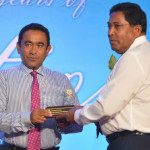Amnesty International has announced that “significant human rights challenges” need to be addressed following a nine day visit to the Maldives, where it met with senior government figures and civil society organisations.
In a statement released Thursday (April 25), Amnesty International said that despite the country making “considerable progress” during the last few years in promoting and protecting civil rights, it retained concerns over issues like freedom of expression and wider accountability in the criminal justice system.
The findings were made as part of initial observations by Amnesty’s South Asia Director Polly Truscott and the NGO’s South Asia Researcher Abbas Faiz following a visit to the country between April 16 to April 24 this year.
Speaking to Minivan News at the conclusion of her visit this week, Truscott detailed some of the key human rights challenges facing the country. Among her observations was the controversial flogging sentence handed to a 15 year-old girl over charges of ‘fornication’, which she believed to be just the “tip of the iceberg” in regards to wider issues over how sexual offence victims were treated in the country.
The current government has already appealed the flogging sentence, while also pledging to move ahead with wider legal reforms concerning the possibility of reviewing the use of flogging as a punishment.
“On a positive note, Amnesty International welcomes the efforts now made by Maldivian authorities, in particular the President of the Maldives, to strengthen measures to ensure that any child who has been sexually abused receives protection, not punishment,” the NGO’s statement read.
“These include a review of all cases of children who have been investigated for ‘fornication,’ that is, sex outside marriage. Under international human rights law no one who either engages in consensual sexual activity or who is a victim of sexual assault, should be criminalised or punished, regardless of their age.”
Amnesty said it also held concerns over a lack of “effective investigations” into several high-profile attacks on media personnel, as well as the murder of MP Dr Afrasheem Ali.
The NGO has called on the government of President Dr Mohamed Waheed to end an alleged culture of “impunity for the arbitrary and abusive use of force by security forces against demonstrators” following the controversial transfer of power on February 7, 2012.
Amnesty International said its calls regarding allegations of “excessive force” by police were in line with recommendations included in the Commonwealth-backed Commission of National Inquiry (CNI) released last year.
The full Amnesty International statement can be read here.






"Under international human rights law no one who either engages in consensual sexual activity or who is a victim of sexual assault, should be criminalised or punished, regardless of their age.”
MDP MP Ahmed Hamza stated earlier that the drafted new penal code will include fornication as a crime and will also have provisions on flogging. I am terribly shocked to hear that amongst this investigation, our society is choosing not to remove this human rights violation from our penal code.
We really just can't seem to move forward can we. Maybe we just have to wait a few thousand years for some kind of enlightenment in the Muslim communities.
Amnesty Intl is basically asking the people of the Maldives to go against their religious beliefs. You can expect a Zebra to lose is stripes.
*can't
Amnesty can keep releasing reports - but without curtailing the power that mullahs have over the minds of Dhivehistanis we cannot achieve any progress. HR recommendations will accepted only when they are made palatable to the country's culture, in this case 9th century Abbbasid culture. Dhivehistanis need to be convinced that this is not an empire under attack by the hordes of Genghis Khan or a colony being Christianized by the missonaries of 16th c. Portugal. They also need to be fed another variant of the Islamic poppy - one that is less destructive. They need to dose on the progressive values and liberal interpretations of it before they can be fully rehabilitated into 21st century civilization. The problem is that the mullahs, like drug pushers, keep pumping the addicts, and the moderates, like the parents of Maldivian addicts, keep ignoring the problem. That apathy is going to be your downfall.